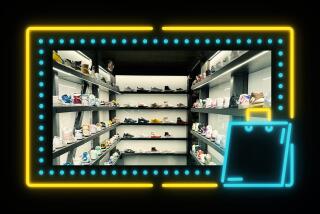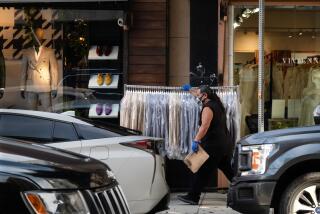Hard Sell : Old-Fashioned Santa Ana Hardware Store Is Modern Success Story
- Share via
It used to be that every town worthy of the name had one--a genuine hardware store, its crowded aisles jammed with whatever it took to satisfy the needs of the mechanics and farmers and builders and handymen and homeowners in the neighborhood.
Urbanization and the rise of chain and discount stores like Builder’s Emporium and the Home Club have chased away many of those old-time hardware shops, but in Orange County there is a place that almost every serious do-it-yourselfer, mechanic, machinist, plumber, carpenter and electrician knows about.
It is Clark Dye Hardware in downtown Santa Ana, and it has become an Orange County institution, known not only for the huge variety of goods it offers its customers but also for its unswerving resistance to modernizing its cramped and overflowing quarters.
It is the place clerks in other stores send you to when they don’t have what you want or have no idea what it is you are trying to describe.
In industry parlance, Clark Dye is a pure hardware store. No lumber, no garden center, no auto parts.
It sells washers for faucets that haven’t been made for 50 years and square spindles for old-fashioned, glass door knobs. It sells 53 types of tape measures, several hundred kinds of cabinet hinges and drawer pulls, 40 styles of padlocks, 17 types of needle-nose pliers and 10 sizes and styles of gasoline cans. It sells $2,500 power saws, delicate precision measuring instruments, $200 ornamental pickle jars with sterling silver fittings and $2,950 faucet sets for custom bathrooms.
It also sells just about everything in between, including a huge selection of ceramic gift ware and rococo mirrors and picture frames oozing gold leaf. More than 1,000 square feet of the store’s precious retail space is given over to the gift items, which co-owners Don McLaughlin and Oliver Marquis have never considered getting rid of because they account for a sizable number of sales and, more important, bring people into the store.
The 7,000-square-foot store, founded in 1946 by Clark Dye and acquired by McLaughlin and Marquis in 1980, is a standout in the nation’s $14.7-billion retail hardware industry, based on customer count and sales per square foot.
It does it all in a cramped building that has not been remodeled since opening day under a management team that doesn’t believe in computerizing inventory controls but does believe in treating every customer as if he or she were vitally important to the store’s survival.
“We put in a computerized billing system after we took over,” said McLaughlin, “but even though a number of people have tried to sell us inventory control systems, we don’t have one. We know when we are running out of something that we’ve sold a lot of and need to order more. If we got into computers and special codes it would just tie up customers at the cash register. It would mean we were doing our inventory control on our customers’ time, and that’s not fair to them.”
Instead, Clark Dye Hardware floods its cramped selling floor with as many as 33 sales clerks at a time; makes sure those clerks know the goods they are selling and spares no effort not only to help customers find what they are looking for but to anticipate their needs and have items in the store that someone might want, someday.
Thus, Clark Dye still carries ice tongs--on the off chance that someone will have to carry enough 50-pound blocks of ice to justify purchasing a pair for $59.95. The proud builder who wants to do a ground breaking up right can buy a $160 chrome-plated ceremonial shovel. Not order it. Buy it. The hardware store keeps several in stock at all times. It also stocks two types of ironing boards that mount in concealed cabinets in the wall. One style costs $350; the other is $450. “People don’t line up to buy them,” McLaughlin said, “but they move OK, and our customers know that they are always here if they want one.”
That attitude, inherited from Dye, goes a long way toward explaining the store’s phenomenal numbers.
“When this store opened, it was just another hardware store,” said McLaughlin, who sold hardware to Dye for 27 years as a representative of Los Angeles-based California Hardware before teaming up with store manager Marquis to buy the shop when Dye decided to retire.
Gambled and Won
“But Clark was astute about what people wanted. He gambled on putting in more and more hardware and housewares and gift items. He didn’t want people to have to wait for stuff to come in on special orders. So today, if someone comes in and wants 1,000 of a particular style of hook to hang coffee cups on, chances are we have it. Clark’s credo was that this is a customer’s store and that the customer comes first.”
Clark Dye is not everyone’s idea of what a hardware store should be, of course. One man, who was climbing into his Mercedes-Benz sedan after an early-morning visit to the store, acknowledged that it had a lot of stock. But he said he hadn’t bought what he was looking for because the prices were “too expensive, just too expensive.”
Balboa Island resident Roger Bennett, however, doesn’t mind the prices. “You get the quality you are willing to pay for,” he said. Bennett said he has been an “off-and-on” customer since moving to Orange County from San Marino in 1960.
In the ensuing 28 years, he said, he and his wife have bought, fixed up and sold several homes in Newport Beach and have always used hardware and tools from Clark Dye. “We were driving up here from Newport when Main Street was just a two-lane road,” Bennett said. “I like it because they carry top-quality stuff, and their prices are quite competitive. Most hardware stores just carry the less expensive lines of tools and fixtures, but here you’ve got a huge selection.”
A survey of 800 hardware, home center and lumber stores by the National Retail Hardware Assn. showed that the average hardware store in 1986 had gross sales of $695,635, or about $105 per square foot of retail space. The 1987 gross sales average is expected to increase to about $730,000, the association said.
$5 Million in Sales
Clark Dye Hardware last year posted gross sales of just over $5 million, McLaughlin said. That works out to about $714 per square foot--nearly seven times the national average.
The average hardware store--one that does not sell lumber--had about 72,160 customers in 1986 and each customer spent an average of $9.64.
Clark Dye, which is closed on Sundays, was visited by about 197,600 customers last year, according to its owners. Each spent an average of $25.30.
The average store has about $164,000 worth of stock on hand at any given time. Clark Dye’s inventory is valued at about $2 million, Marquis said.
Much of that volume is generated by word of mouth. Clark Dye’s only advertising is a weekly full-page ad in a local newspaper.
For many customers, just getting to the central Santa Ana store is a major expedition because, as McLaughlin puts it, “there is no easy way to get here. I think about that all the time. But people know where we are, and I’ve never had the courage to think seriously about moving. So far, our customers don’t seem to mind, as long as we do our job properly.”
Currently, all those customers--an average of 600 each weekday and 800 on Saturdays--are funneled through just two cash registers--the busiest spots in the store. “There was only one register when we bought the place,” said McLaughlin. “That was really tough. It’s still tough, but there’s nowhere else to put one right now.”
Breaks Rules for Success
If one word describes the Clark Dye operation, it is unique , said Michael Owen, director of member services and store development for the California Pacific Hardware Assn. in San Francisco.
“It’s so successful, and we don’t know why,” he said. “The store is difficult to shop in, it’s crowded and hard to find merchandise. It’s not a store that’s oriented to the do-it-yourselfer. You have to have an employee walk you through it. It is the opposite of everything we tell most stores to be. But it is successful. It is simply amazing to us that they’re selling $5 million or more every year.”
To McLaughlin and Marquis, however, there is no mystery.
They just keep doing things pretty much the way Clark Dye did them.
That is why the layout of the store has changed little in the past 42 years. “This place is one-of-a-kind in Orange County, and our customers wouldn’t like it if we changed things too much,” said McLaughlin.
“We are an independent hardware store, and I treasure that. All the others look alike and sell the same things.”
A few changes have been made, however.
Under McLaughlin and Marquis, Clark Dye Hardware has added to its inventory screen doors and steel-barred security doors, metal and plastic tool boxes that span the width of a pickup truck bed, “and a few other things that Clark didn’t want,” McLaughlin said.
Always Something New
“Clark was in the other day,” he said, “and looked around and told me he didn’t see anything more that we could put in to sell, but I don’t know, there’s always something.”
To prepare for that something more, one other change is about to take place at Clark Dye Hardware.
The lease on the tire shop next door has finally expired, and the hardware store bought the building--with which it shares a common wall.
Sometime next year, the two shops will be connected with a new, unified front, and a small portion of the tire shop will be added to Clark Dye’s retailing area. The rest of the space will be used to boost the hardware store’s warehousing--which currently occupies the basement and attic of the original store, plus two wood-frame homes and a doctor’s old brick office on the same block on South Main Street.
But the changes won’t be radical. And the interior look will remain the same. Hardware, tools, housewares and gifts were stacked on every available flat space, hanging from the ceiling and bolted to the walls. There also will be room for another cash register or two, but that is about it.
After all, McLaughlin asked, why fix what works?
SUCCESS BY THE NUMBERS: CLARK DYE VS. THE INDUSTRY AVERAGES
Average U.S. Clark Dye Hardware Store Hardware Gross sales $695,635 $5,000,000 Inventory value $163,156 $2,000,000 Retail sales space (square feet) 5,827 7,000 Sales per square foot retail $105.34 $714.29 Total space (square feet) 9,059 18,000 Sales per square foot total $67.11 $277.78 Sales per customer $9.64 $25.30 Total annual customers 72,160 197,600
Sources: National Retail Hardware Assn. and Clark Dye Hardware
More to Read
Inside the business of entertainment
The Wide Shot brings you news, analysis and insights on everything from streaming wars to production — and what it all means for the future.
You may occasionally receive promotional content from the Los Angeles Times.









